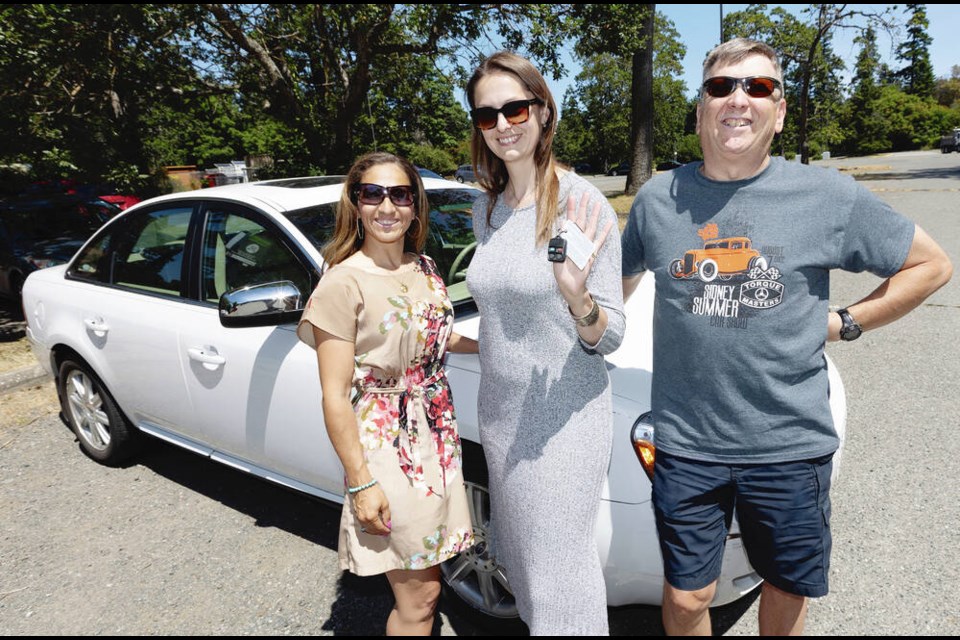The Torque Masters Car Club based in Sidney is best known for its members’ hot rods, rat rods and other custom cars.
But a call for help set the gears in motion for members to find and refurbish reliable cars to help Ukrainians who had fled the war for a safe haven in East Sooke.
“It all started off with a neighbour of mine at Eagle Ridge Estates mentioning some of the refugees staying at the Ukrainian Safe Haven needing vehicles to get around in,” said Curtis Smith, a vice-president of the club.
“It started off as a fundraiser, with the club matching individual donations of up to $1,500 to purchase one car — then we got another.”
Ukrainian Safe Haven already had a vehicle for the residents to share, but with nine families living under one roof at the former Grouse Nest resort, it was always in demand.
Along with needing the vehicle for grocery shopping or to medical appointments, several of those living at the haven would borrow it to attend language classes.
The need became even more acute as some found work and needed transportation.
“We are in a remote area and the bus service in East Sooke is poor,” said Brian Holowaychuk, who operates Ukrainian Safe Haven. “Transportation is a crucial piece of the puzzle for people to lead a normal life.”
When informed that vehicles had been donated, the group of refugees voted among themselves to determine who would get them.
The first, a 2004 Ford Taurus, went to a carpenter, so he could get to job sites.
The second, a 2006 Ford 500 sedan with 58,000 kilometres, went to Vitaliia Atamaniuk, a surgeon, so she could attend classes at the Lansdowne campus of Camosun College.
“I would take a bus, but it is a half an hour walk to the bus stop and some of my classes start at 8:30 a.m.,” said Atamaniuk, who is in Canada with her six-year-old daughter and 18-month-old son.
Before the war, the family lived in Ivano-Frankivsk, a city of about 1.3 million people in western Ukraine, close to Lviv.
When Atamaniuk and the children fled, her husband, who is also a surgeon, stayed behind. “His skills are much needed in the country now,” she said.
Known internationally in the medical community, Atamaniuk has been invited to make presentations at two medical conferences this year on her research on veins, including deep vein thrombosis.
Although she was a practising surgeon in Ukraine, her qualifications don’t meet Canadian medical standards, so she is in the process of upgrading her English-language skills and taking a number of medical exams so she can work in Canada. She expects to graduate next semester.
Holowaychuk, whose Ukrainian grandparents fled Russian persecution and settled in Canada about 120 years ago, called getting a vehicle “a big leg up” for the Ukrainians. “It is a tremendous help.”
He said that his guests are hard-working people, with many finding jobs and paying taxes.
He recounts how a 16-year-old Ukrainian got a job at a restaurant. When she got her paycheque, she kept only a third of her wages, splitting the other two-thirds between her grandmother, who is still in Ukraine, and the country’s army.
Holowaychuk, who runs the refuge with his wife, Sharon, said the war has become a “brain drain” for Ukraine, as many of his guests plan to stay after the conflict ends. The couple rely on charity to house the Ukrainians, and receive no government funding.
Buoyed with its success so far, the car club is on the hunt for more vehicles — whether they’re donated or sold to the club for a nominal amount.
So far, they have turned down seven cars for every one they accept, however. They want to make sure the vehicles are in good condition and reliable before handing them over.
“Sometimes the risk is too high and the gain too small,” said Smith. “We have to do due diligence, as our reputation is on the line. We’re looking for cars [that are] not at the end of their lives.”
The club will, however, accept vehicles for their scrap value. An older Mercedes-Benz that was donated yielded $250 for the catalytic converter, as well as a few hundred dollars when it was sold as scrap metal.
For more information, or to donate, go to ukrainiansafehaven.org. The group also has a Go Fund Me campaign at gofundme.com/f/helping-ukrainian-refugees-in-canada.
>>> To comment on this article, write a letter to the editor: [email protected]



